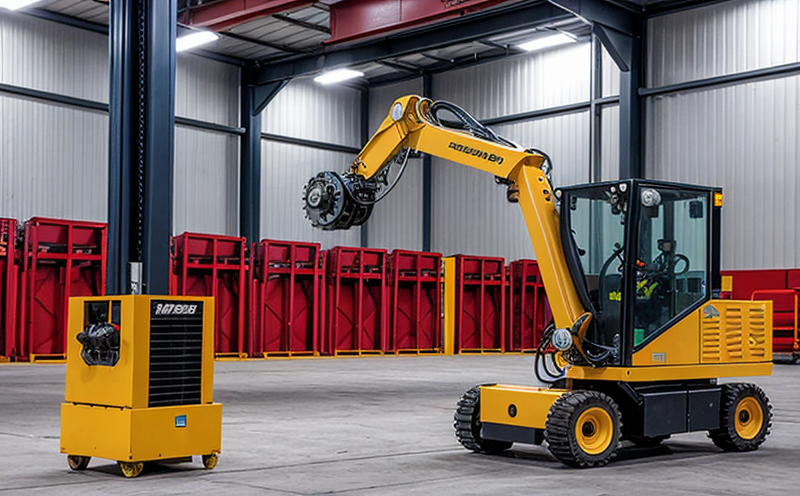Testing joint torque for robots used in material handling operations
The Crucial Step in Ensuring Robot Reliability Testing Joint Torque for Material Handling Operations
In the world of industrial automation, robots have become an integral part of material handling operations, revolutionizing the way goods are transported and processed. However, to ensure that these machines perform optimally and efficiently, it is crucial to test their joint torque. At Eurolab, our laboratory service specializes in testing joint torque for robots used in material handling operations, providing businesses with a reliable and accurate assessment of their robotic systems.
What is Testing Joint Torque?
Testing joint torque involves measuring the rotational force or torque generated by a robots joints as it performs specific tasks. This test simulates real-world operating conditions, allowing our experts to evaluate the robots ability to handle various loads and movements. The data obtained from this test helps identify potential issues, optimize robotic performance, and prevent costly downtime.
Why is Testing Joint Torque Essential for Businesses?
In todays competitive manufacturing landscape, businesses can ill afford equipment failures or reduced productivity. Testing joint torque for robots used in material handling operations ensures that these machines are operating within safe limits, thereby reducing the risk of
Equipment damage Excessive torque can lead to premature wear and tear on robotic joints, resulting in costly repairs or even replacement.
Downtime Inefficient or poorly performing robots can cause production delays, impacting overall productivity and profitability.
Worker safety Robots that are not functioning correctly can pose a risk to human operators, compromising workplace safety.
Advantages of Using Testing Joint Torque for Robots Used in Material Handling Operations
Our testing service offers numerous benefits for businesses, including
Improved efficiency By optimizing robotic performance, our test results help reduce cycle times and increase productivity.
Enhanced reliability Accurate torque measurements ensure that robots operate within safe limits, minimizing the risk of equipment failure.
Cost savings Identifying potential issues early on prevents costly repairs or replacements down the line.
Compliance with regulations Our testing service helps businesses meet industry standards and regulatory requirements.
Key Benefits of Testing Joint Torque for Robots Used in Material Handling Operations
Reduced energy consumption Optimized robotic performance leads to lower energy costs and a reduced carbon footprint.
Increased accuracy Precise torque measurements ensure that robots perform tasks accurately, reducing the risk of errors or defects.
Extended equipment lifespan Regular testing helps prevent premature wear and tear on robotic joints, extending their lifespan.
Improved maintenance planning Our test results enable businesses to schedule maintenance activities more effectively, minimizing downtime.
A Closer Look at the Testing Process
Our expert technicians use state-of-the-art equipment to conduct thorough testing of your robots joint torque. The process typically involves
Preparing the robot Our team ensures that the robot is in a stable and operational condition before conducting the test.
Measuring torque We use advanced sensors and measurement tools to record the rotational force or torque generated by each joint as it performs specific tasks.
Analyzing data Our experts review the collected data, identifying any potential issues or areas for improvement.
QA Section
Q What types of robots can be tested?
A We test a wide range of industrial robots used in material handling operations, including articulated robots, SCARA robots, and delta robots.
Q How long does the testing process take?
A The duration of our testing service varies depending on the complexity of the robot and the scope of the test. Our experts will provide a tailored estimate based on your specific needs.
Q What kind of data do you collect during the test?
A We gather detailed torque measurements, as well as other relevant data such as speed, acceleration, and vibration levels.
Q Can I witness the testing process?
A Yes, our laboratory is open to visitors, and we encourage businesses to observe their robots testing process. Our experts will explain each step of the test and provide a comprehensive report of the results.
Conclusion
Testing joint torque for robots used in material handling operations is an essential step in ensuring these machines perform optimally and efficiently. At Eurolab, our laboratory service provides businesses with accurate and reliable assessments of their robotic systems. By identifying potential issues early on, we help reduce equipment damage, downtime, and worker safety risks, ultimately contributing to increased productivity and profitability. Contact us today to learn more about how our testing service can benefit your business.
Additional Resources
Whitepaper The Importance of Testing Joint Torque for Industrial Robots
Case Study Reducing Equipment Downtime through Robotic Joint Torque Testing
Infographic The Benefits of Testing Joint Torque for Material Handling Operations
At Eurolab, we are committed to providing the highest level of expertise and service in testing joint torque for robots used in material handling operations. Our team is dedicated to helping businesses optimize their robotic systems, ensuring maximum efficiency, reliability, and safety.




